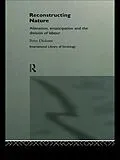One of the main features of the contemporary environmental crisis is that no one has a clear idea of what is going on. The author uses an extension of Marx's theory of alienation to explain why people find it so difficult to relate their different knowledges of the natural and social world. He argues that nevertheless it is possible to relate these to the abstractions of ecological discourse. Emancipation can come only through embracing science and rationality rather than rejecting them and, in the process, humanity as well as the non-human world will benefit.
Autorentext
Peter Dickens is Reader in Sociology at the University of Sussex.
Inhalt
Introduction 1 SOCIETY, NATURE AND THE BALKANISATION OF ABSTRACT KNOWLEDGE 2 UNDERSTANDING ALIENATION: FROM THE ABSTRACT TO THE CONCRETE 3 REALISM, SOCIAL CONSTRUCTIONISM AND THE PROBLEM OF 'NATURE' 4 WHO WOULD KNOW? SCIENCE, LAY KNOWLEDGE AND ALIENATION 5 INDUSTRIALISING NATURE'S POWERS 6 CIVIL SOCIETY: THE RECOVERY OF WHOLENESS? 7 KNOWLEDGE, STATE AUTHORITY AND THE DIVISION OF LABOUR 8 GREEN UTOPIAS AND THE DIVISION OF LABOUR EPILOGUE: HUMANISING NATURE, NATURALISING HUMANS
